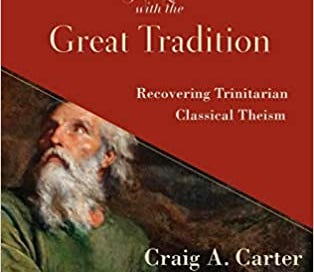Once upon a time, it was fashionable to say that the simple, devout, and monotheistic faith of Jesus and the apostles was supplanted by the later church who were drunk on Greek philosophy with its speculative categories and mythical ideas. So Jesus the peace-loving rabbi was replaced with Jesus the apotheosized deity. The loving and relational God of Paul was replaced by an immutable and unfeeling God of dogmas and creeds. The hellenization of Christian thought meant an active departure from the simple and sublime faith of the church’s infancy.
Such a view that the church was corrupted by its hellenization was shared by many fundamentalists and liberals alike in the nineteenth and twentieth centuries.
To which I say: balderdash.
When the church said that Jesus and the Father were homoousios (same substance) they were not importing philosophical ideas into the faith, but using the tools of language and philosophy to express biblical judgments (HT David Yeago). For case in point, homoousios is using ontological language to express what Scripture affirms: (1) Jesus is equal to God … even in being (in light of Phil 2.6); and (2) If Jesus is the son of the Father and one with the Father, then he’s of the same “stuff” as the Father ( Jn 3.16, 18; 10.20).
Craig A. Carter’s recent book Contemplating God with the Great Tradition: Recovering Trinitarian Classical Theism (Grand Rapids, MI: Baker, 2021) is a great defense of the biblical rootedness and theological coherence of Christian trinitarian theism.
My favourite part of the book is chapter 7 on “The Biblical Character of Pro-Nicene Theology.” Carter writes (pp. 216-17):
Athanasius spends many pages going through one biblical text after another, doing detailed exegesis with the goal of showing how the Bible teaches that the Son is indeed one with the Father.
They deny that the Son is the proper offspring of the Father’s essence, on the ground that this must imply parts and divisions; what is this but to deny that He is very Son, and only in name to call Him Son at all? And is it not a grievous error, to have material thoughts about what is immaterial, and because of the weakness of their proper nature to deny what is natural and proper to the Father.
Athanasius grounds his defense of the Nicene Creed’s use of homoousion in the fact that Scripture speaks of Christ as the Son of the Father. If it is illegitimate to utilize a material image to describe the immaterial relationship of the Son to the Father, then we are thereby criticizing Scripture itself. The point is that Scripture authorizes language drawn from the material world in calling the Father “Father” and the Son “Son.” Thus we are following the pattern of biblical words in describing the relationship between them as homoousion - oneness in being or substance—and if Scripture can use such language as father and son analogically to speak of the shared deity of the Father and Son, then we can do so as well. Essentially, Athanasius is arguing that the word homoousion is biblical in the sense that it names a biblical concept- Athanasius says,
When the Father says, “This is my beloved Son,” and when the Son says that God is His own Father, it follows that what is partaken is not external, but from the essence of the Father…. What is from the essence of the Father, and proper to Him, is entirely the Son.
So let us hear no more nonsense about the supposed imposition of Greek metaphysics on the Bible by the fourth-century fathers! They approach the subject with reverence and a determination to be biblical in all that they say about the Triune God. At the outset, they could not use language that unambiguously meant what the Bible means because that language had not Yet been invented. They were taking concepts and breaking them apart by hammering them on the anvil of Scripture and then reforging them in the flame of truth until they were bent into a usable shape for proclaiming the gospel. They deserve better than being accused by moderns who are knee-deep in the liberal project of selling out their birthright of the gospel for a mess of philosophical porridge.
You can listen to a podcast here with Craig Carter about christology.





This was very interesting to listen to. While listening I enjoyed having my assumptions challenged. The biggest difference I hear in conversation about classical theism and open/relational theism is how each position articulates their opposition arguments. I have yet to hear someone from a classical position argue the open and relational position well or with any depth or knowledge and understanding of the open and relational perspective. People who are open and relational however have a deep understanding of classical theism as it is a rejection of the modes of thought that they were taught as children. Just my heretical two cents 👻